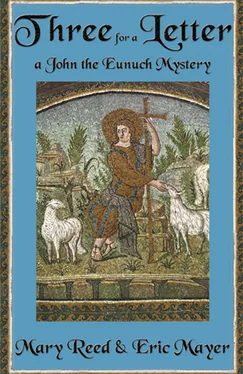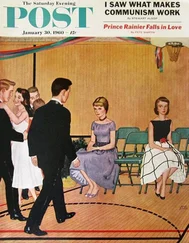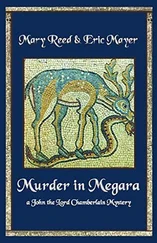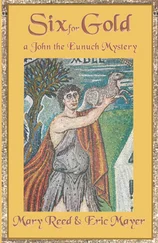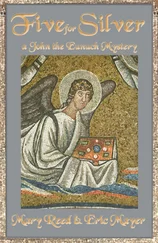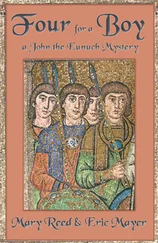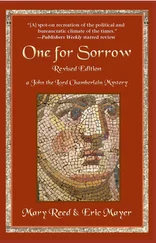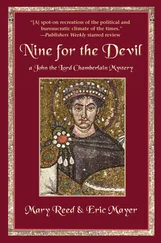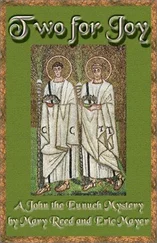Mary Reed - Three for a Letter
Здесь есть возможность читать онлайн «Mary Reed - Three for a Letter» весь текст электронной книги совершенно бесплатно (целиком полную версию без сокращений). В некоторых случаях можно слушать аудио, скачать через торрент в формате fb2 и присутствует краткое содержание. Год выпуска: 2011, ISBN: 2011, Издательство: Poisoned Pen Press, Жанр: Исторический детектив, на английском языке. Описание произведения, (предисловие) а так же отзывы посетителей доступны на портале библиотеки ЛибКат.
- Название:Three for a Letter
- Автор:
- Издательство:Poisoned Pen Press
- Жанр:
- Год:2011
- ISBN:9781615951758
- Рейтинг книги:5 / 5. Голосов: 1
-
Избранное:Добавить в избранное
- Отзывы:
-
Ваша оценка:
- 100
- 1
- 2
- 3
- 4
- 5
Three for a Letter: краткое содержание, описание и аннотация
Предлагаем к чтению аннотацию, описание, краткое содержание или предисловие (зависит от того, что написал сам автор книги «Three for a Letter»). Если вы не нашли необходимую информацию о книге — напишите в комментариях, мы постараемся отыскать её.
Three for a Letter — читать онлайн бесплатно полную книгу (весь текст) целиком
Ниже представлен текст книги, разбитый по страницам. Система сохранения места последней прочитанной страницы, позволяет с удобством читать онлайн бесплатно книгу «Three for a Letter», без необходимости каждый раз заново искать на чём Вы остановились. Поставьте закладку, и сможете в любой момент перейти на страницу, на которой закончили чтение.
Интервал:
Закладка:
“That’s a mystery as well. The children’s nursemaid insists she saw both of them safely to bed. She’s only a girl herself and distraught. Understandably so, of course. The arrangement of their apartments is such that Gadaric would have had to come through her room in order to get out.”
“Ah, but when children want to get up to mischief-well, you know how it is with children.”
John smiled thinly. “About as well as I know how it is with the natives of Hyperborea.”
***
Hyperborea. As John, having bid Gaius a safe journey home, strode off to the workshops at the back of the villa he decided it wasn’t surprising that the name of the dubious northern kingdom of ancient Greek legends had come to his lips. After all, he had spent the last few days surrounded by such strange marvels as doors that opened automatically, a mechanical satyr dispensing an endless stream of wine, and a serpent-slaying automaton.
The rambling garden also displayed some of its owner’s previous interests. John could not begin to identify the rioting beds of exotic flowers, no doubt planted during a horticultural craze, while the small temples and statues scattered here and there bore mute witness to passing fascinations with various religious cults.
The workshops were much more mundane. Housed in a series of low brick buildings augmented by wooden sheds and lean-tos facing a courtyard, they looked as if they had been lifted straight from one of the grimier streets snaking between the Hippodrome and the sea walls of Constantinople.
Everything in this less public area-the overgrown mass of shrubbery edging the courtyard, the fountain set in its center, even the small marble statue of Eros standing in a bed of exotic flowers beside a bench under the courtyard’s lone tree-retained the dreary dullness of an undusted room despite the fresh morning sunlight.
John tasted smoke in the air. It burnt the back of his throat as he entered the main building and spoke to the man manipulating the tongs thrust into an aperture in the side of the mechanical whale.
John introduced himself, adding, “I take it that you are Hero, the builder of this marvel?”
“The inventor of the creature, yes.”
The man who had turned to face John had very nearly the appearance of a Nubian, the darkness of his skin enhanced by the stain of the smoke in which he must often have labored. John, having learned that Hero was Egyptian, had addressed him in his own tongue, but the man had answered in excellent Greek.
“Hero was also the name of the ancient Alexandrian inventor,” John remarked. “Coincidence or fate?”
“Neither, Lord Chamberlain. I took the name myself.” Hero smiled, displaying even teeth. His eyes were large and liquid, his beard spotty, and his black hair tightly curled close to his scalp. He had broad shoulders and a muscular right arm. His left arm ended abruptly at the elbow.
“Zeno informs me that you can explain the whale’s workings to me.”
“Indeed?” Hero bridled. “And doubtless the Patriarch of Constantinople could explain to you the nature of God if you had sufficient time.”
John observed mildly that a rough description would be acceptable.
“Very well then, Lord Chamberlain. It was a rather a hurried construction, I will admit. My assistants didn’t have much time.” He tapped the side of the whale. “The skin, as you can see, is painted canvas stretched over wooden ribbing similar to the frame of a boat. An old fisherman from the village assisted us with that part of the work.”
Hero made a circuit of his creation, opening small doors in its frame to reveal taut loops of rope, cogged gears, and labyrinths of tubing. The air in the workshop was thick with the heat radiating from the forge in a corner. Tools, as inexplicable to the layman as those in Gaius’ surgery, littered wooden tables set along the walls. Beached in the middle of the timber-ceilinged workshop, the whale appeared less impressive than while swimming through Zeno’s dining room. Somewhat taller at its head than John, its back sloped down toward the tail.
“The spouting action is accomplished with the aid of a sealed vessel partly filled with water,” Hero explained. “When its top is removed, the liquid is forced out by the action of compressed air.”
“And when the whale rolled out and then back again, with no apparent human aid each time?”
“Ah,” Hero beamed. “A most striking effect, is it not? Yet easily accomplished. It’s done by winding two ropes, one in each direction, around the back axle of the whale’s base. Now, as you see, inside the creature are two compartments, each half filled with sand.” Showing John the mechanism as he described it, he went on, “Each compartment contains a weight to which one of the ropes is tied. The weight rests on the sand. When the bottom of the first compartment is opened, the sand flows out and the weight it supports descends as it empties, pulling its rope down with it. That in turn moves the axle to which the rope is tied. Thus the whale rolls forward. Later, when the other compartment begins to empty, the process is repeated and the whale rolls backward. It’s the sort of device has been used in the theater for hundreds of years,” he concluded.
Nonetheless, John expressed admiration for the ingenuity of the arrangement and then questioned Hero concerning the construction of the whale’s teeth. They had circled the creature and were now standing by its open maw.
“Unfortunately, Zeno insisted they be made of bronze. He liked the way the metal shone in lamp-light inside the mouth. The lamps ignite automatically, by the way. Strikers attached to the gears ignite their wicks at the proper time and the gears are set in motion by certain rods governed by water clocks.”
“A complicated affair indeed,” John observed.
“Extremely complicated, yes, but simple enough for one as familiar as I am with such machinery. Still, even though I’ve given it a lot of thought, Lord Chamberlain, I just can’t explain how anyone could have caused the mouth to close on the child.”
John glanced up sharply. “Surely it was an accident?”
“It was no accident.” Hero’s voice was suddenly harsh. “Look!” He angrily shook the stump of his arm. “I lost this years ago in some fool’s badly designed gears. I would never build an unsafe device. Never! In fact, the mouth was kept closed at all times. Let me show you something.”
He dragged a stool over to the whale and directed John to climb up and look under the trapdoor in the top of the beast’s head.
“That’s where you get into the whale, Lord Chamberlain, provided you’re small enough, that is. I didn’t want to risk any possibility of the mouth shutting on anyone.”
John opened the trapdoor and looked down into the beast’s dark interior briefly. “I can see it would be a dangerous venture without such safety precautions,” he agreed as he stepped back down.
“And especially dangerous for me, considering it was Theodora’s favorite mime who was going to be inside. Small as Barnabas is, the empress would not have been pleased to see him diminished further.”
“And as to the matter of the performance at the banquet…?”
“The beast requires considerable preparation before its few moments of life,” Hero replied. “There are vessels to be filled with air and water. The ropes must be wound correctly and tied to weights, sand has to be poured into compartments, the lamps filled with oil, that sort of thing.”
“You saw to all this personally, I take it?”
“Yes, during the afternoon, right here in the workshop. A couple of servants pulled it into Zeno’s dining room at the appropriate time. The wooden platform it sits on has wheels, as you saw, although I have them blocked at the moment.”
Читать дальшеИнтервал:
Закладка:
Похожие книги на «Three for a Letter»
Представляем Вашему вниманию похожие книги на «Three for a Letter» списком для выбора. Мы отобрали схожую по названию и смыслу литературу в надежде предоставить читателям больше вариантов отыскать новые, интересные, ещё непрочитанные произведения.
Обсуждение, отзывы о книге «Three for a Letter» и просто собственные мнения читателей. Оставьте ваши комментарии, напишите, что Вы думаете о произведении, его смысле или главных героях. Укажите что конкретно понравилось, а что нет, и почему Вы так считаете.
